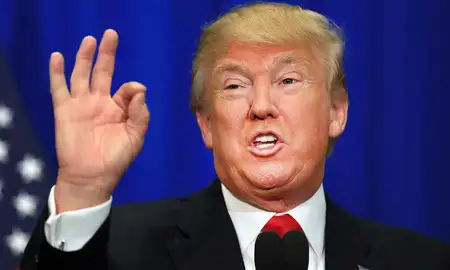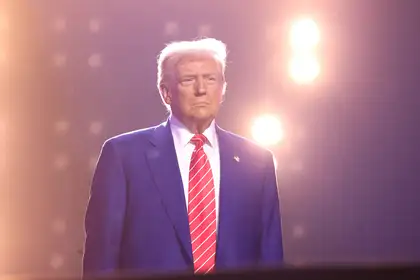
President-elect Donald Trump at AmericaFest in Phoenix, Arizona, December 2024. Photo credit: Gage Skidmore, CC BY-SA 2.0, via Wikimedia Commons.
This opinion piece was originally published in the Sunday Star Times.
The inauguration of incoming United States President Donald Trump will be historic for many reasons. Trump is the first president in 130 years – and only the second ever – to be inaugurated to a non-consecutive second term. He will be the first convicted felon ever to be inaugurated as president, and the first president to have multiple criminal proceedings against him ended because of being elected.
There is also a certain intrigue in comparing this inauguration to the last one, in 2020, when Trump denied the legitimacy of the election results, then encouraged a mob to storm the Capitol to disrupt the election proceedings and finally refused to attend the inauguration ceremony. He was the first president to refuse to attend a successor’s inauguration in over 150 years.
In contrast, all four former living presidents – Clinton, Bush, Biden and Obama – will attend Trump’s inauguration. Whatever their opinions of the once and future president, they will be in attendance to honour a process revered as the embodiment of the peaceful transfer of power.
Adding to the drama will be the comparison to Trump’s first inauguration ceremony in 2016. At that time, there was still hope that perhaps like others before him, Trump might rise to meet the moment, tempering his rhetoric and embracing the solemn responsibility of the presidency. Instead, his first inauguration is best remembered for his dark, dystopian speech featuring the phrase “this American carnage”. The supposed carnage that was happening in the US at that time, Trump said, would end on his watch. At the conclusion of the speech, fellow Republican and former President George W Bush whispered to Hillary Clinton, “That was some weird shit!”
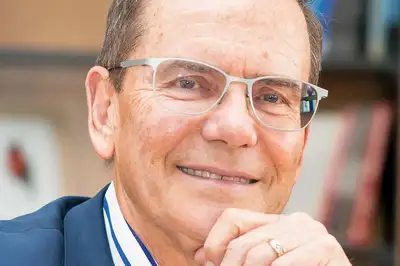
Professor Ted Zorn.
Whether Trump’s speech this time will return to dystopian “American carnage” themes is unknown. Ironically, given the US’s comparatively high rate of deaths from the Trump government’s handling of the COVID-19 pandemic, as well as the deaths and brutality resulting from Trump’s instigation of the attack on the US Capitol on January 6, 2021, the phrase “American Carnage 2.0” has in recent days become repurposed as a meme to convey expectations for his second term.
The forthcoming inauguration ceremony, which starts at noon on January 20 (US Eastern Standard time; 6am on January 21 in New Zealand) presents many Americans with a dilemma. Those of us who have opposed Trump have done so on many grounds, but perhaps none evokes as much passion as the idea of defending democracy from the threat we see him to pose. And, like the former presidents, Americans of all political stripes see the inauguration ceremony as emblematic of the peaceful transfer of power and may feel compelled to honour the US’s democratic legacy by watching the inauguration.
On the other hand, many recoil at the prospect of celebrating the inauguration of a man who they see as a direct threat to democracy, to decency, and to the rule of law. Michelle Obama has said she will not attend the inauguration. While she has not offered a reason, her allies say it is because of her disdain for Trump.
Similarly, nearly all my fellow Democrats Abroad New Zealand (DANZ) colleagues say they will not watch the inauguration. Many cite their outrage at Trump’s history of flouting the norms of the presidency and, by extension, as DANZ member Kate Lewis said, “the profound significance and dignity of the inauguration”. Another member, Arthur Schenk, said similarly, “To paraphrase a popular meme, I won’t watch someone swear an oath they have no intention of keeping.” Many others believe that doing something other than watching the inauguration is necessary for their mental health and wellbeing. Andrea Sisk King was one of those. She stated, “I want to start the next four years in the spirit with which I plan to continue them: ‘This too shall pass.’”
Personally, I’m going to watch it. Yes, I revere the peaceful transfer of power, but even more than that, I want to know what’s coming. While what Trump says can rarely be taken at face value, in my mind there is still value in paying attention to the signals and the priorities he conveys.
The American political commentator Rachel Maddow often says, “Watch what they do, not what they say.” So, while the spotlight will be on the inauguration ceremony and Trump’s speech, all eyes should be on what happens later that afternoon when Trump takes the reins of power.
He has promised massive changes “on day one". Some of these promises we can likely write off as hyperbole. In the same way he didn’t build a wall and get Mexico to pay for it as he promised in his first term, it’s not likely this time that he will end the war in Ukraine within 24 hours of taking office – which he has promised to do.
But there are other dramatic changes promised in his first 24 hours in office that are possible. These include the start of the largest mass deportation of undocumented immigrants in US history, closing the border with Mexico completely, restoring his controversial travel ban from some majority-Muslim countries, issuing pardons for those convicted of crimes relating to the storming of the Capitol on January 6, 2021, and imposing massive tariffs through setting up an “External Revenue Service” to collect the tariffs, mirroring the Internal Revenue Service, the US equivalent of the IRD.
He’s also promised to end the “deep state” – code for government personnel who prioritise laws and regulations rather than loyalty to Trump. There are reports that his staff are apparently already vetting national security personnel to see if they are Trump-friendly.
Each of these “day one” promises will have massive and potentially disastrous consequences.
American Carnage 2.0, here we come.
Professor Ted Zorn, originally from the USA and with dual New Zealand-American citizenship, is a Professor of Organisational Studies at Te Kunenga ki Pūrehuroa Massey University.
Related news
Opinion: How will American Kiwis survive and thrive in the next Trump presidency?
By Professor Ted Zorn
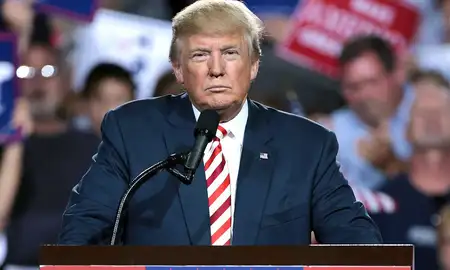
Opinion: Do a third of Americans really hate their own country?
Hyper-patriotism in the United States means the country is waging an endless war on itself, says Professor Ted Zorn.
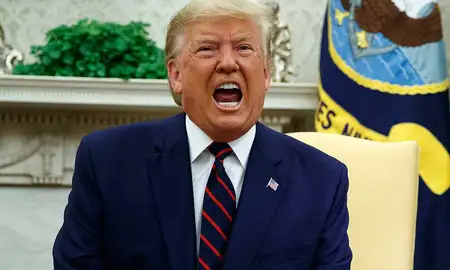
Opinion: Trump's strategy of distract and deluge
Professor Ted Zorn analyses the way US President Donald Trump controls the news cycle with a constant stream of outrageous behaviour.
